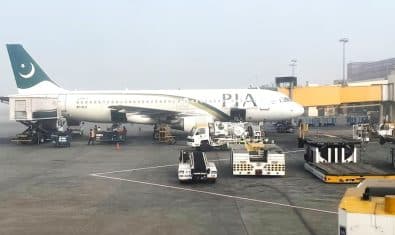32 percent of the firms in Pakistan identify corruption as a major business constraint. This is higher than the average for South Asia, which is 28 percent, and higher than the global average of 29 percent.

Constraints such as corruption which are high in Pakistan compared to other regions in the world, can reduce opportunities for new entrants into the market and raise overall costs of operating, Gallup Pakistan said in its report “Corruption – World Bank Enterprise Survey 2022”.
The proportion of firms in Pakistan experiencing at least one bribe payment request has reduced significantly in the last few years coming down to 16 percent in 2022 from 31 percent in 2013 and 60 percent in 2007.
In 2022, approximately 32 percent of Pakistani firms considered corruption a major constraint marking a steep decline from 68 percent in 2013 and 59 percent in 2007. This could be due to businesses being coopted by officials or other business constraints which are felt worldwide being on the rise.

This may signify a change in attitudes and behaviors of individuals who give and receive bribes. 16 percent of firms in Pakistan report at least one incidence of bribe requests, which is lower than the South Asian and worldwide average of 21 percent and 16 percent, respectively. These changes can occur if channels of payments or gifts have changed in nature or if governments are stricter in regulating business activities.

11 percent of the surveyed firms identified the court system as a major business constraint. This estimate is in line with 14 percent of firms in South Asia reporting courts as a major business constraint and firms worldwide reporting 15 percent.
The effects of corruption can be exasperated when firms are unable to receive timely and fair court decisions and can decrease the overall ease of doing business.

That being said, firms may be less likely to report instances of bribery in order to increase their chances of survival and ensure that the services provided by such officials are continued. These practices make it harder for individuals who are unaware of industry practices to enter the market and can cause unexpected delays and a rise in the cost of goods produced.
Prevalence of Corrupt Practices
22 percent of firms in Pakistan report giving gifts to government officials in order to “get things done”. This is lower than the South Asian average of 24 percent and the global average of 19 percent.
Instances of corruption across all industries in Pakistan vary but are widely seen as ways to get electrical and water connections at 57 percent and 81 percent respectively as well as securing licenses to import and export goods (20 percent). This is particularly true for the manufacturing industry.

59 percent of the firms in Pakistan are expected to give gifts to receive construction permits. While only 37 percent of firms are expected to pay in South Asia and only 20 percent of firms are expected to pay worldwide. This marks further increased costs for businesses that want to expand and decreases willingness to invest in businesses when combined with other costs such as gifts expected for tax officials, government contracts, and other bureaucratic procedures.

While executing agencies such as the National Accountability Bureau (NAB) are granted extensive powers, the issue of routine corruption practices faced by business owners is not being adequately addressed.
Many businesses may also be observed utilizing these practices and failing to meet specified requirements for tax payments. This may potentially impact their motivation to disengage from these activities and could have potential benefits such as reduced tax payments and decreased regulation and scrutiny of their activities.

The above figure shows that firms expected to give gifts in order to receive contracts has varied significantly over the 15 years with 30 percent of firms expected to pay in 2007, approximately 88 percent of firms in 2013 with a sharp decline in 2022 with only 16 percent of firms expected to give gifts. This significant drop is worth exploring and may mark a positive shift in the relationships between government officials and the success of firms.
Practices of receiving and giving gifts to government officials may be rampant when firms are engaging in activities that involve payment of taxes and in order to gain government contracts. This reduces the opportunity for growth for smaller and reduces the willingness of investors who cannot operate amidst informal roadblocks, the report added.
Corruption in Different Sectors
As discussed above, 32 percent of Pakistani firms believe that corruption is a major business constraint. These figures may vary between sectors and industries. In Pakistan, approximately 16 percent of organizations operating in both the manufacturing and service sectors have acknowledged receiving at least one request for a bribe payment.
Trends may vary even within a given industry, with businesses in the South Asia region reporting a slightly higher rate of 22 percent, while firms in other parts of the world reported a slightly lower rate of 15 percent.

Particularly in the manufacturing industry, 49 percent of firms in the motor vehicle and transportation equipment sector, 37 percent of firms in the chemical products industry, and 22 percent of firms in the textile sector report receiving at least one request for a bribe.
These requests may depend on factors such as the size of the business itself and aspects such as the number of permits and government approval that they need to operate such as firms in chemical manufacturing require extensive government support in order to function. Similarly, vehicle manufacturers require large-scale approvals and continued support to operate on a mass level.
These industries need consistent and regular approvals in order to operate and thus may be encouraging government officials to take advantage of the situation at hand.

Similarly, in the services sector, 28 percent of all firms identify corruption as a major constraint. 27 percent of firms in retail, 21 percent of hotels and restaurants, and 33 percent of firms that provide other services view corruption as a major constraint. When compared to the manufacturing industry it is clear that the nature of the firm and business affects how prevalent corrupt practices are.
According to the report, firms that are in the informal sector may not face these challenges as much as other sectors, thus are less likely to interact with government officials, they are also less likely to expand in ways that require extensive government support.






















Bhai corruption hay. sub ko pata hay. aur ab aur ziada hogaye hay.
In reality it’s more than 32 percent or you can say these companies dare to speak otherwise it would be more than 90 percent.
it should be 100% of companies, not 32% of companies